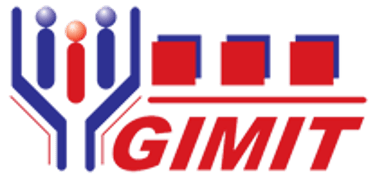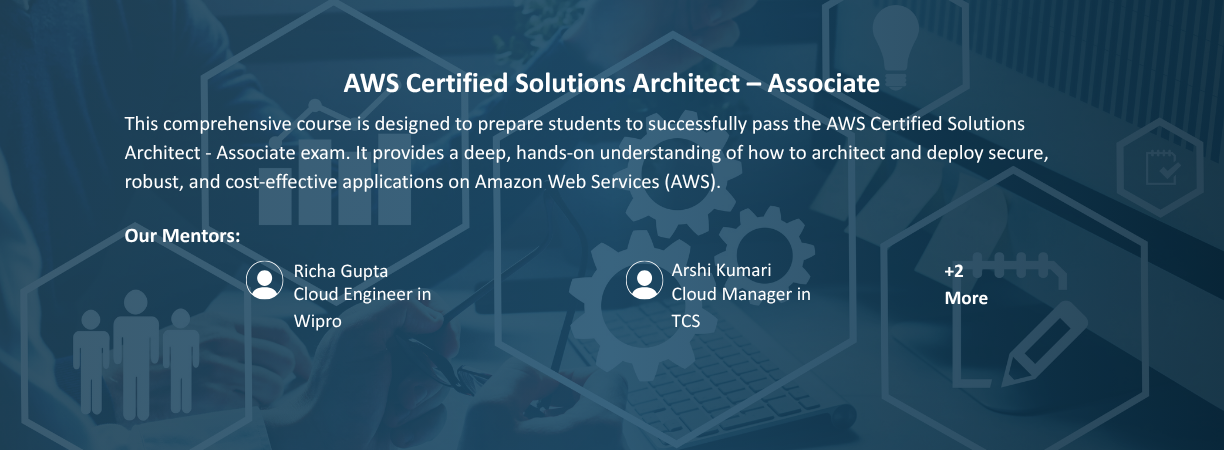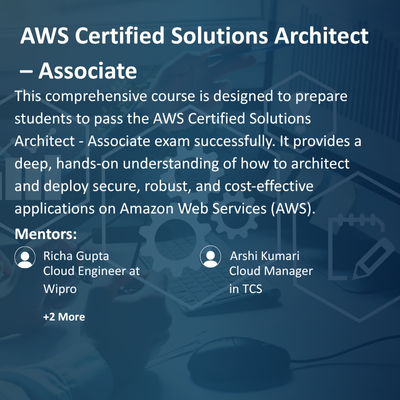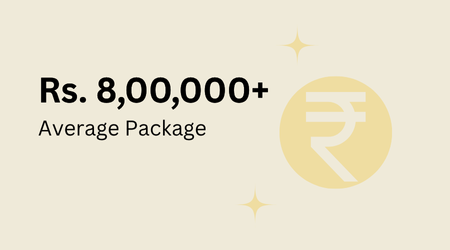



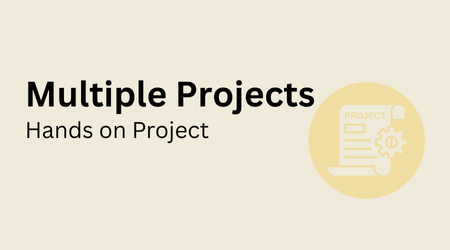



Major Industry Recruiters
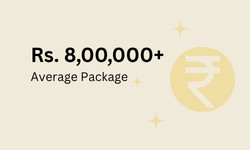







Major Industry Recruiters
Course Description:
This comprehensive course is designed to prepare students to pass the AWS Certified Solutions Architect - Associate exam successfully. It provides a deep, hands-on understanding of how to architect and deploy secure, robust, and cost-effective applications on Amazon Web Services (AWS).
The course emphasizes architectural design principles based on the AWS Well-Architected Framework, covering best practices for:
Security: Securing workloads and data in the cloud.
Resilience: Designing fault-tolerant, highly available, and reliable systems.
Performance: Optimizing compute, storage, and networking performance.
Cost Optimization: Implementing cost-saving strategies for AWS resources.
Upon completion, students will be ready to confidently evaluate customer requirements and make appropriate technical recommendations using a wide array of AWS services.
Course Objective:
The primary objective of this course is to prepare students to successfully pass the AWS Certified Solutions Architect – Associate (SAA-C03) exam and effectively function as an entry-level AWS Cloud Architect.
Upon completion of this course, students will be able to:
Design Secure Architectures by implementing best practices for IAM, data encryption, and network security across AWS services.
Design Resilient Architectures that are highly available, fault-tolerant, and scalable using services like Auto Scaling, ELB, and Multi-AZ deployments.
Design High-Performing Architectures by optimizing compute, storage (e.g., S3, EBS), and networking (e.g., CloudFront, Route 53) performance.
Design Cost-Optimized Architectures by making informed decisions on service selection, pricing models, and resource monitoring to minimize cloud spending.
Translate customer requirements into technical, Well-Architected Framework-aligned AWS solutions.
Course Module:
The following modules cover the essential AWS services and architectural concepts tested in the SAA-C03 exam:
Module 1: Foundational Services and Accounts
AWS Global Infrastructure: Regions, Availability Zones (AZs), Edge Locations.
Identity & Access Management (IAM): Users, Groups, Roles, Policies, and best practices like MFA.
AWS Management and Governance: CloudWatch, CloudTrail, Config, and Organizations.
Module 2: Compute Services
Amazon EC2 (Elastic Compute Cloud): Instance Types, AMIs, EBS Volumes, Instance Store, and placement groups.
Auto Scaling Groups (ASG): Configuration, scaling policies, and health checks for resilience.
Load Balancing (ELB): Application Load Balancer (ALB), Network Load Balancer (NLB), and Gateway Load Balancer (GWLB).
Serverless Compute: AWS Lambda, Amazon ECS (Elastic Container Service), and Fargate.
Module 3: Storage Services
Amazon S3 (Simple Storage Service): Storage Classes, Bucket Policies, Versioning, Encryption, and S3 Glacier for archiving.
EBS (Elastic Block Store): Volume types, Snapshots, and performance considerations.
EFS (Elastic File System) & FSx: Shared storage solutions.
Data Transfer: AWS Storage Gateway, AWS DataSync, and AWS Snow Family.
Module 4: Database Services
Relational Databases (RDS): Multi-AZ for high availability, Read Replicas for performance, and Aurora.
NoSQL Databases: Amazon DynamoDB (scalability, global tables, caching with DAX).
Data Warehousing: Amazon Redshift (for large-scale analytics).
Caching: Amazon ElastiCache (Redis and Memcached).
Module 5: Networking and Content Delivery
Amazon VPC (Virtual Private Cloud): Subnets (Public/Private), Internet Gateway, NAT Gateways/Instances, and VPN.
VPC Connectivity: VPC Peering, Transit Gateway, and AWS Direct Connect.
Security Controls: Security Groups vs. Network ACLs.
Route 53: DNS resolution, routing policies (Latency, Geo-location, Failover).
Amazon CloudFront: Content Delivery Network (CDN) for performance and security.
Module 6: Decoupling and Integration
Messaging Services: Amazon SQS (Simple Queue Service), Amazon SNS (Simple Notification Service), and Amazon MQ.
Event-Driven Architecture: Amazon EventBridge (CloudWatch Events) and AWS Step Functions.
Module 7: Security and Automation
Security Services: AWS WAF, Shield, GuardDuty, KMS, and Secrets Manager.
Infrastructure as Code (IaC): Introduction to CloudFormation for automated resource deployment.
Disaster Recovery (DR): RTO/RPO concepts and implementation strategies.
Cost Management: Tagging, Cost Explorer, and AWS Budgets.
Course Overview:
The curriculum is structured around the four main domains of the SAA-C03 exam, with a heavy emphasis on scenario-based learning to simulate real-world architectural challenges.

Upcoming Batches: Choose as per Your Requirement
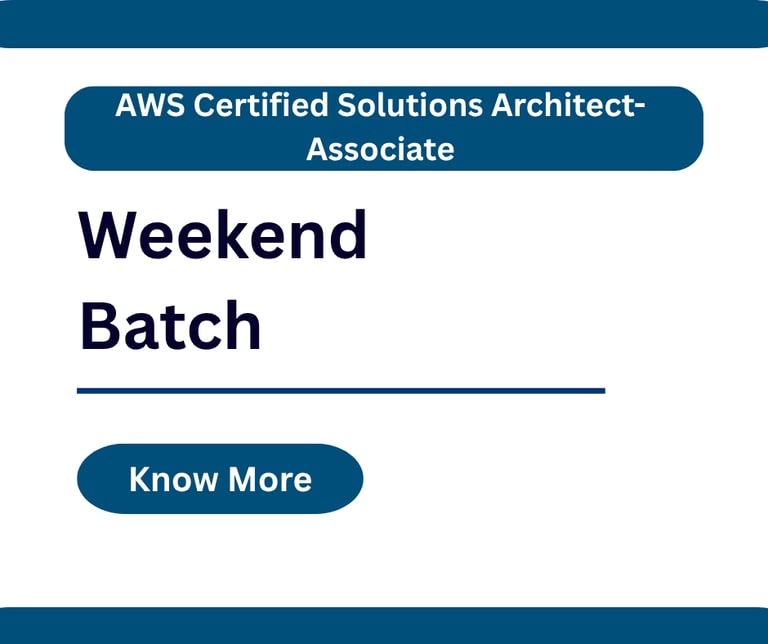

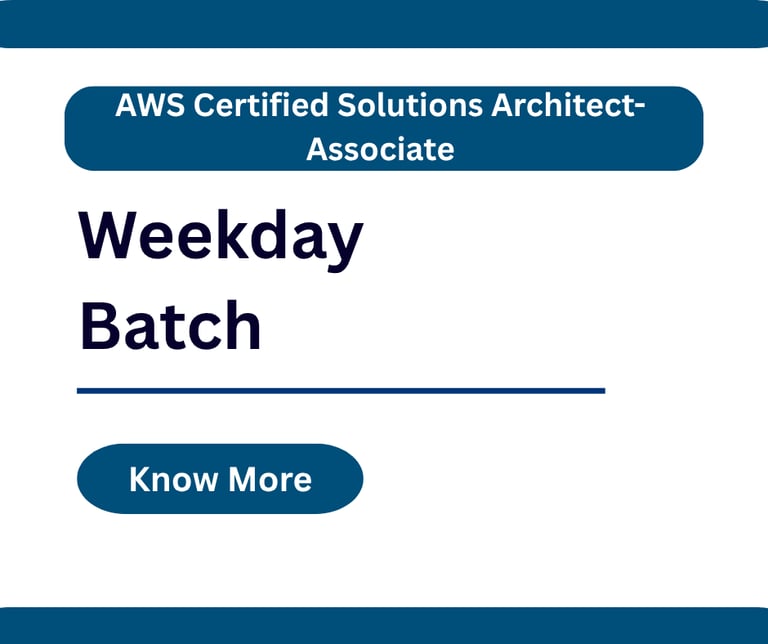

Our Mentors:
Richa Gupta
Cloud Engineer in Wipro
Arshi Kumari
Cloud Manager in TCS
Ahmed Khan
Cloud Engineer in Cognizant
Abhishek Singh
Cloud Engineer in IBM
Our Mentors:
Richa Gupta
Cloud Engineer in Wipro
Aina Rathor
DevOps Engineerex-Deloitte
Ahmed Khan
Coud Engineer in Cognizant
Coud Engineer in IBM
Abhishek Singh
Our Alumni Work at Top Companies
FAQs – AWS Certified Solutions Architect- Associate at GIMIT
1) What does the AWS Certified Solutions Architect – Associate certification validate?
It validates your ability to design and deploy secure, robust, and cost-effective applications on Amazon Web Services (AWS) using key architectural principles and best practices.
2) What is the current exam code for the AWS Certified Solutions Architect – Associate certification?
The current exam code is SAA-C03.
3) What is the recommended, non-mandatory prerequisite experience for taking the SAA-C03 exam?
AWS recommends at least six months of hands-on experience with AWS, including designing and deploying cloud solutions.
4) What are some of the job roles this certification is ideal for?
This certification is ideal for Solutions Architects, Cloud Engineers, Developers, and anyone responsible for designing and implementing cloud infrastructure on AWS.
5) What is the question format of the SAA-C03 exam?
The exam consists of multiple-choice and multiple-response questions.
6) How long do candidates have to complete the AWS Certified Solutions Architect – Associate exam?
You are given 130 minutes to complete the exam.
7) What is the minimum passing score required on the SAA-C03 exam?
The minimum passing score is 720 (out of a scale of 100 to 1,000).
8) How long is the AWS Certified Solutions Architect – Associate certification valid?
The certification is valid for three years.
9) What is the AWS Well-Architected Framework, and why is it covered in the exam?
It is a set of design principles provided by AWS to help build systems that are secure, high-performing, resilient, and efficient. Understanding these principles is critical for the exam.
10) Name two foundational AWS services that candidates should focus on for the SAA-C03 exam. Candidates should focus on foundational services like EC2, S3, VPC, IAM, RDS, and Route 53 (any two of these, or others like Auto Scaling and ELB, are acceptable).
